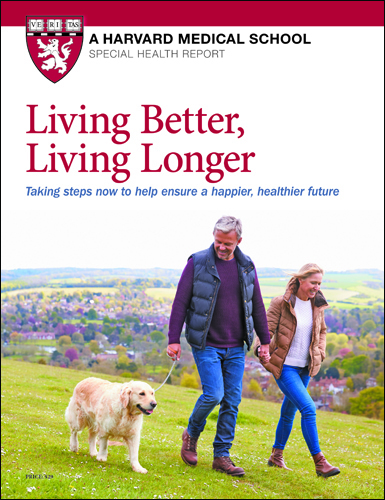A care quarterback for older adults
Switching to a geriatrician may be a wise move.
- Reviewed by Toni Golen, MD, Editor in Chief, Harvard Women's Health Watch; Editorial Advisory Board Member, Harvard Health Publishing; Contributor

In your 60s and 70s, your days might include pounding the tennis court, leading board meetings, or globe-trotting with your grandchildren — pursuits seemingly out of step with the notion that it might be a smart time to switch to a geriatrician.
But if you're as proactive about your health as you are about the other areas of your life, a geriatrician may indeed be the ideal choice. These internists complete additional training in the care of people 65 and older, evaluating each patient's "big picture" to tailor advice and interventions to changing bodies and social structures.
Indeed, a geriatrician — who's likely to nudge you to tackle aging-related problems you might otherwise ignore — could be a better match for your outlook than a general practitioner, who may view older adults as winding down, says Dr. Suzanne Salamon, clinical chief of gerontology at Harvard-affiliated Beth Israel Deaconess Medical Center.
"Many people like it when we push them to get screening tests like bone density scans, colonoscopies, and mammograms, whereas other doctors might tell them they don't need those anymore," Dr. Salamon says. "We also prod people to get their hearing checked or try hearing aids — which so many are resistant to — because it makes such a huge difference in how they function."
Many want to age in place, but don't prepareWhile the vast majority of people over 50 wish to keep living in their current homes as long as possible, a new poll suggests few have actually prepared for this "aging in place" ideal. Released in April 2022, the National Poll on Healthy Aging involved online and phone responses from 2,277 adults ages 50 to 80. It revealed that 88% reported that staying in their homes was "very" or "somewhat" important. But only 15% of respondents had seriously considered the modifications they might need to make to their homes to accommodate aging in place, such as installing bathroom grab bars or creating a first-floor master suite. "People really want to stay in their homes, where things are familiar," says Dr. Suzanne Salamon, clinical chief of gerontology at Beth Israel Deaconess Medical Center. "Some people in their 80s have lived in their homes for 50 years. But many of those homes are two or three stories, and the steps are dangerous." A geriatrician can help patients explore types of support available to them at home and encourage communication between patients and family members to set aging-in-place goals and follow through on them, Dr. Salamon says. |
Crucial look at medications
With the average life expectancy for American women today stretching to nearly 83, geriatrics is perhaps more relevant than ever. The specialty predominantly centers on health concerns that become increasingly common as birthdays pile up, including falls, hearing loss, incontinence, memory problems, and the need to juggle multiple health conditions and medications.
After 65, more than half of adults typically live with three or more chronic conditions, such as high blood pressure, heart disease, diabetes, dementia, or arthritis, according to the American Geriatrics Society. And since nearly 90% of adults 65 and older take at least one prescription drug — and 54% report taking four or more — geriatricians' focus on this aspect of aging is especially important, Dr. Salamon says.
The geriatrician comprehensively assesses all prescribed and over-the-counter drugs and supplements for each patient. This keen analysis aims to find the best dosages and pinpoint which medications might overlap or cause dangerous side effects, such as confusion, weakness, or unsteadiness.
As part of their first geriatrics visit, "we tell patients to bring all their medications in a bag, not just a list of them," Dr. Salamon explains. "I'm amazed at how often people have duplicate medications in their bag but not on their list, and they don't know what they're taking."
Benefits outweigh stigma
Geriatricians are sometimes dubbed health care "quarterbacks" because they coordinate each patient's treatment with her other specialists, helping to manage chronic conditions. Specialists may even suggest that patients switch from a general practitioner to a geriatrician to manage their overall care, Dr. Salamon says.
"If an issue comes up with a patient, I'll often send an email to all of the other specialists to let them know my thoughts, or see if they have objections or advice," Dr. Salamon says.
You can also ask your primary care doctor for a consultation with a geriatrician if you're experiencing new problems, such as memory loss or falling, and both physicians can work together to help manage these issues.
Another clear benefit: geriatricians typically spend 30 minutes or more with patients during visits, about 50% longer than the average primary care appointment, Dr. Salamon notes.
For many people, the only barrier to accessing the advantages of a geriatrician is their own hesitance. Despite the nearly 10,000 Americans turning 65 every day, there's still a "big stigma" about geriatric care, Dr. Salamon acknowledges. "Baby boomers like what geriatricians do," she says, "but they don't like the word."
Image: © Terry Vine/Getty Images
About the Author

Maureen Salamon, Executive Editor, Harvard Women's Health Watch
About the Reviewer

Toni Golen, MD, Editor in Chief, Harvard Women's Health Watch; Editorial Advisory Board Member, Harvard Health Publishing; Contributor
Disclaimer:
As a service to our readers, Harvard Health Publishing provides access to our library of archived content. Please note the date of last review or update on all articles.
No content on this site, regardless of date, should ever be used as a substitute for direct medical advice from your doctor or other qualified clinician.
















